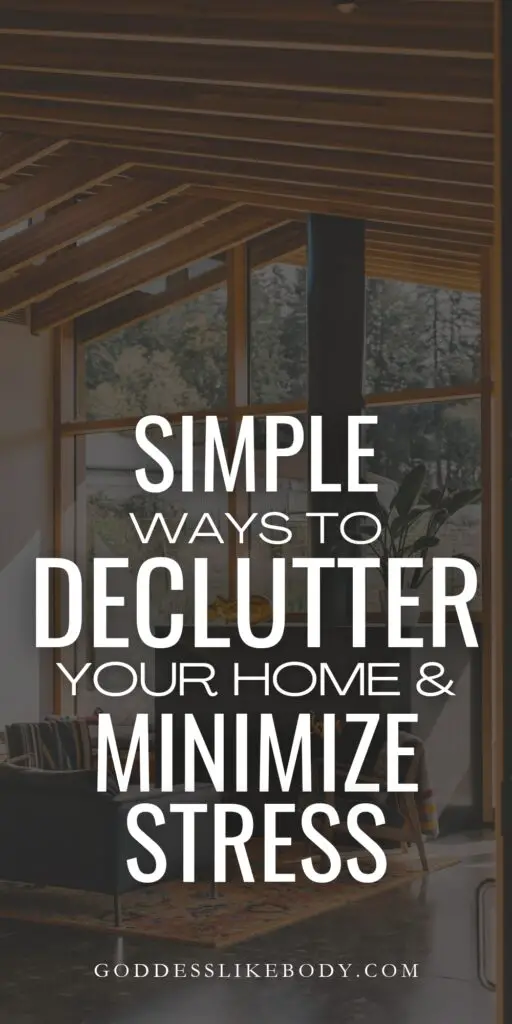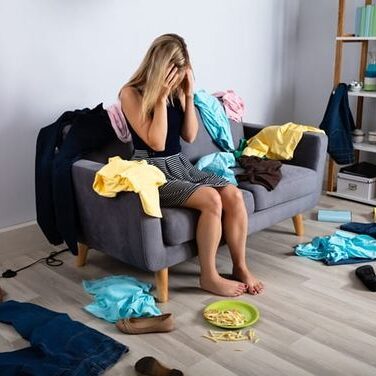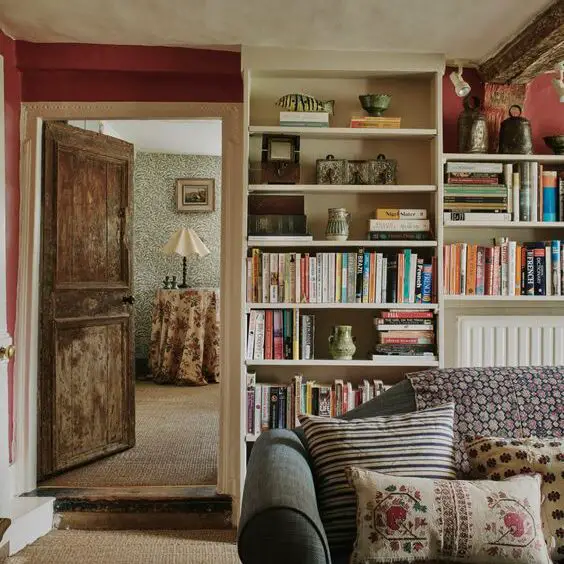Keeping your home tidy goes beyond aesthetics; it’s about establishing a haven that calms the spirit.
Creating a peaceful haven amidst the bustle of daily life is the true essence of organization, above mere aesthetics and drawers.
Busy? Save this pin for later.
We make our products useful and remove extraneous things to create a calm and soothing atmosphere.
Living in a cluttered space can have a more profound impact on our mental well-being than we might think.
The presence of clutter can lead to a cluttered mind, contributing to increased stress and anxiety levels. It disrupts our ability to focus and compromises our productivity.
On the other hand, a well-organized space can enhance mental clarity and efficiency, leading to improved mental health.
Here are some key points to consider about the impact of clutter on stress levels:
Scattered Thoughts and Lack of Concentration: An unorganized environment can result in scattered thoughts and an inability to concentrate on tasks.
It becomes challenging to stay focused when surrounded by clutter. By decluttering, we create a space that allows our minds to concentrate and work more efficiently.
Time Wasted and Frustration: Clutter often leads to wasted time spent searching for items. It can be frustrating to dig through piles of belongings to find what you need.
By decluttering and creating designated spaces for items, we eliminate the frustration caused by disorganization and save valuable time.
Improved Productivity and Satisfaction: A clutter-free space promotes productivity and satisfaction. With everything in its proper place, it becomes easier to locate items and accomplish tasks efficiently.
This leads to increased work output and overall satisfaction.
1. Understanding the Impact of Clutter on Stress Levels
Before diving into the decluttering process, it’s essential to set realistic goals and expectations.
Decluttering doesn’t mean getting rid of everything; it means creating order and making space for what truly matters. It’s a process that takes time, so be patient with yourself.
To ensure a smooth decluttering process, gather the necessary supplies beforehand.
Consider having the following items on hand:
- Trash bags: Use these for items that need to be discarded.
- Boxes: Keep boxes for items that can be donated or given away.
- Storage containers: Invest in storage containers to organize and store items effectively.
Having these supplies readily available will streamline the decluttering process and make it more efficient.
You Might Also Like: 10 DIY Home Decor Ideas That Will Transform Your Space
2. Getting Started: Preparing for Decluttering
When decluttering the living room, focus on removing unnecessary items from surfaces and organizing items in storage spaces.
Here are some specific actions you can take:
Discard Old Magazines: Get rid of old magazines that you no longer read or need. They take up space and contribute to visual clutter.
Organize Books on a Shelf: Arrange your books in a visually pleasing manner, either by genre, author, or color. This not only reduces clutter but also adds a touch of style to your living room.
Designated Spot for Remote Controls: Find a designated spot for remote controls to avoid losing them or having them scattered around the room.
Consider using a decorative box or an organizer to keep them organized and easily accessible.
Creating a peaceful bedroom space is integral to maintaining a stress-free home.
Here are some tips for decluttering your bedroom:
Organize Your Wardrobe: Sort through your clothes and donate or discard items that you no longer wear or that are worn out.
Organize your remaining clothes by category or color to make getting dressed easier.
Declutter Your Nightstand: Clear your nightstand of unnecessary items, such as old receipts or random trinkets. Keep only essentials, like a lamp, a book, or a glass of water.
Free Your Bed from Unnecessary Items: Avoid using your bed as a storage space. Remove items like laundry, pillows, or extra blankets that don’t belong there.
A clean and organized bed promotes better sleep and relaxation.
Simplifying the kitchen and pantry can make cooking a more enjoyable task.
Consider the following tips:
Discard Expired Food Items: Check your pantry and refrigerator for expired food items and discard them.
This not only creates more space but also ensures that you’re using fresh and safe ingredients.
Organize Kitchen Utensils and Appliances: Declutter your kitchen drawers by organizing your utensils and tools.
Utilize drawer dividers or small containers to keep items separated and easily accessible.
The same goes for your appliances – keep them tidy and stored in a designated area.
Clear Countertops of Clutter: Keep your countertops clear and free of unnecessary items.
Only have essential items, like a coffee machine or a knife block, on display. This creates a clean and functional workspace.
Streamlining the bathroom involves decluttering and organizing your toiletries.
Here’s how you can achieve a well-organized bathroom:
Discard Expired or Unused Products: Check your medicine cabinet and vanity for expired or unused products.
Dispose of them properly and free up space for items you actually use.
Organize Your Toiletries: Use storage containers or drawer dividers to keep your toiletries organized.
Group similar items together, such as skincare products or hair accessories, to make them easily accessible.
Clean Surfaces and Clear Clutter: Regularly wipe down surfaces and keep them free of clutter.
Avoid leaving items like toothbrushes, toothpaste, or makeup strewn across the countertop.
A clean and clutter-free bathroom makes your daily routine more efficient and enjoyable.
Tackling home office clutter is crucial for maintaining productivity.
Here are some steps you can take:
Organize Your Paperwork: Sort through your paperwork and create a system for organizing important documents.
Use folders, binders, or filing cabinets to keep everything in order.
Declutter Your Desk: Clear your desk of unnecessary items and keep only what you need within arm’s reach.
Use desk organizers or trays to store pens, notepads, and other essentials.
Neatly Arrange Office Supplies: Keep your office supplies neatly arranged and easily accessible.
Use desk drawers or small containers to store items like paperclips, sticky notes, and staplers.
3. Sorting and Decision-Making Strategies
Sorting items into categories can be an effective approach to decluttering.
Here are some practical strategies to help you make clear decisions:
Keep, Donate, Sell, or Discard: Sort items into categories such as ‘keep’, ‘donate’, ‘sell’, or ‘discard’.
This method ensures that each item is dealt with appropriately.
Emotional Attachments: Overcoming emotional attachments to belongings can be challenging but is crucial for successful decluttering.
Remember that memories reside in our minds, not in objects. Letting go of items that no longer serve us can be a liberating experience.
Utility and Joy: When deciding whether to keep or discard an item, ask yourself questions about its utility and joy it brings to your life.
If it serves no purpose or doesn’t bring you joy, it might be time to let it go.
You Might Also Like: 5 Simple Cozy Christmas Home Decor Ideas
4. Storage Solutions and Organization Tips
Utilizing storage containers and labels effectively can greatly enhance your organization efforts.
Consider the following tips:
Storage Containers: Invest in storage containers of various sizes to group similar items together.
For example, use clear containers to store seasonal clothing or labeled bins for children’s toys.
Labels: Labeling containers, shelves, or drawers makes it easier to locate specific items.
Use a label maker or adhesive labels to identify the contents of each storage container.
Creative storage ideas can be particularly useful for small spaces.
Here are a few suggestions:
Utilize Vertical Space: Install wall-mounted shelves or hanging organizers to make the most of vertical space.
This helps keep the floor clear and maximizes storage capacity.
Multi-purpose Furniture: Opt for furniture pieces that serve multiple functions, such as ottomans with hidden storage or beds with built-in drawers.
This allows you to make the most of your space while keeping belongings organized.
Unique Storage Solutions: Get creative with storage solutions, such as using decorative baskets, hanging shoe organizers, or repurposing old crates.
These unique storage options can add style and functionality to your home.
Maintaining an organized home requires regular routines.
Consider implementing the following habits:
Daily Tidying: Set aside a few minutes each day to tidy up your home.
Put away items that are out of place and ensure everything is in its designated spot.
Weekly Deep Cleans: Dedicate a specific day each week for deep cleaning tasks, such as vacuuming, mopping floors, and dusting.
This helps prevent dirt and clutter from accumulating.
Seasonal Decluttering Sessions: Schedule decluttering sessions at the beginning of each season to reassess your belongings and make necessary adjustments.
This prevents clutter from building up over time.
Implementing daily habits can prevent clutter accumulation.
Here are some practices to consider:
Tidying As You Go: Make it a habit to tidy up as you go about your day.
Put things back in their designated spots immediately after use to avoid clutter buildup.
Return Items to Designated Spots: Avoid leaving items lying around. Train yourself to return items to their designated spots after use.
This ensures that everything is easily accessible and reduces visual clutter.
Deal with Mail and Paperwork Immediately: Sort through mail as soon as it arrives and discard or file it accordingly.
Avoid letting paperwork pile up, as it can quickly contribute to a cluttered environment.
Regular decluttering sessions are crucial for maintaining a stress-free home.
Here’s why:
Easier to Maintain: It’s much easier to maintain a decluttered home than to constantly battle clutter.
Regular decluttering ensures that unnecessary items don’t accumulate over time.
Continued Stress Relief: By regularly decluttering, you maintain a stress-free environment and prevent clutter from negatively impacting your mental well-being. It’s a proactive approach to minimizing stress.
You Might Also Like: 7 Affordable Tips for Creating a Stylish Home
FAQ
1. How does clutter impact stress levels?
Clutter can lead to scattered thoughts, lack of concentration, wasted time, frustration, and decreased productivity.
By decluttering, we create a space that promotes focus, efficiency, and satisfaction.
2. What supplies do I need for the decluttering process?
To streamline the decluttering process, it’s helpful to have trash bags for discarding items, boxes for donation or giveaway items, and storage containers to effectively organize and store belongings.
3. How can I declutter my bedroom?
To declutter your bedroom, organize your wardrobe by sorting and donating or discarding clothes you no longer wear.
Clear your nightstand of unnecessary items and avoid using your bed as storage. Keep it clean and free from unnecessary items.
4. What are some sorting and decision-making strategies for decluttering?
You can sort items into categories such as keep, donate, sell, or discard. Overcoming emotional attachments to belongings is important, and considering the utility and joy an item brings to your life can help make clear decisions.








Leave a Reply
You must be logged in to post a comment.